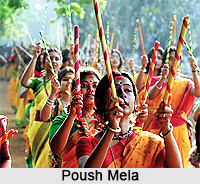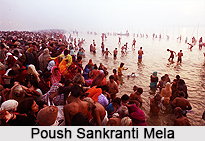 Fairs in Eastern India are the true representation of the spectacular cultural heritage. In the mesmerising natural beauty of eastern India, the great fun and frolic that the fairs generate attracts tourists from different parts of the world to visit them. Myths, legends or events from the past are associated with the origin of each fair. Various activities in the fairs exhibit the rich heritage of the country.
Fairs in Eastern India are the true representation of the spectacular cultural heritage. In the mesmerising natural beauty of eastern India, the great fun and frolic that the fairs generate attracts tourists from different parts of the world to visit them. Myths, legends or events from the past are associated with the origin of each fair. Various activities in the fairs exhibit the rich heritage of the country.Sonepur Cattle Fair
Being an integral part of the culture of Bihar, this fair remains one of the most prominent fairs since ages. There is a legend behind the organization of this fair. It is believed that there were two brothers, one honest and another shrewd, who were devotees of Lord Vishnu. Once they cast spells on each other and consequently one became a crocodile and one an elephant. When the honest elephant went at the confluence of the sacred rivers Ganga and Gandak on a kartik Purnima day, he was attacked by the shrewd crocodile. There, Lord Vishnu saved the good from the evil. Cattle trade is the main focus of this fair and all types of cattle including birds, bovines, poultry etc are marketed in this fair. The fair attracts tourists from all over the country through their traditional musical dramas, circus, fortune telling parrots and exhibition of beautiful fancy products.
Poush Mela
Poush Mela is an important and well known fair of West Bengal which organized every year in Shantiniketan of Birbhum District. Live performances of Bengali folk music, especially Baul music is the most alluring feature of this three day fair. The basis of Poush mela is the acceptance of Brahmo creed by Debendranath Tagore from Ram Chandra Vidyabagish. On 21st December 1891, a Brahma Mandir was established in Shantiniketan and the fair was organized for the first time to celebrate this establishment. Tribal dances, sports and many other events are organized during this fair that showcases the true cultural heritage of India. The fair creates a glamorous and fun filled ambience attracting a number of tourists.

Ambubachi Mela
Ambubachi mela, an annual fair, is organized in the Guwahati district of Assam during the month of Assamese month Ahaar, which falls during the monsoon. The fair is organized in the Kamakhya Temple to celebrate the yearly menstruation course of Goddess Kamakhya. Myth says that Devi Kamkhya, the presiding Goddess of this temple, goes through annual menstruation during this time. It is also believed that the nurturing power of the Goddess reaches to the devotees attending this fair. The fair serves as an important pilgrimage for the people of the entire country. Even the tourists from abroad come to visit this fair to receive the blessings of the Goddess.
Jonbeel Mela
Jonbeel Mela is another grand fair organized in the Marigaon district of Assam. The word Jonbeel comes from the union of two Assamese words jon and beel which refers to moon and wetland respectively. The fair is called so because of a large water body that resembles crescent moon. Jonbeel fair is an ancient fair, the origin of which can be traced to 15th century AD. Ahom Kings were the first to organize this with the purpose of discussing political scenarios. Fair is accompanied by a huge bazaar. The beginning of the fair is marked by fishing by the community people in the wetland of Jonbeel. The fair focuses on spreading brotherhood and harmony among the people of different tribes and communities of this state.
Poush Sankranti Mela
In Tripura, Sankranti Mela is organized every year at Tirthamukh on 14th January. Devotees from different regions belonging to different cultures and tribes visit this fair. The main attraction of this fair is the holy dip in the sacred Gomati River.
For more, visit the link below: